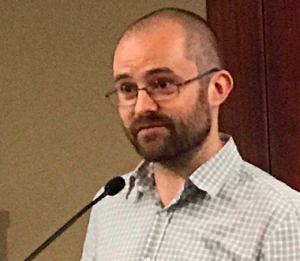Last month saw the release of my first book review and now it’s time for my first Q&A session! I’m grateful to Tobyn Bell for agreeing to be my ‘guinea pig’ for this, particularly as he is so busy right now traveling around Australia and New Zeland talking about Compassion Focused Therapy.
Compassion Focused Therapy is an area I have been interested in for some time and I am very much looking forward to learning more from Tobyn when he comes to Crosby in February next year for the Liverpool BABCP Branch training day.
Tobyn is a cognitive-behavioural therapy trainer, supervisor and programme lead at Greater Manchester West CBT Training Centre, and is a trained mindfulness teacher. As if all of that wasn’t enough, Tobyn has recently co-authored a book entitled ‘Compassion Focused Therapy from the Inside Out: A Self-practise/Self-reflection Workbook for Therapists’. My copy was delivered yesterday so this weekend will no doubt see me drinking lots of tea and having a read!
Q: I’m always interested in how people end up being therapists – what path did you take?
A: I started working in mental health as a psychiatric nurse, on in-patient units and later in the community. When the Early Intervention Teams were first established, for young people experiencing psychosis, the change in ethos and health-care culture felt very exciting. I was exposed to new psychological treatments for this client group and that really prompted me to start my therapy training. I think also receiving psychotherapy myself had a big impact, and has given me valuable experiences of how it feels to be a client. 
Q: Can you tell us a little more about what compassion focused therapy is?
A: CFT is a therapy originally designed for people experiencing self-criticism and shame. It focuses on intentionally cultivating compassion for self and others, and, as a therapy, involves helping clients to overcome their blocks, fears and resistance to compassion. The therapy draws heavily on evolutionary psychology, neuroscience, social and developmental psychology, and Buddhist practice. The evolutionary insights into the human brain are particularly important in highlighting how, and why, the mind and our emotions are so difficult to manage, and how these inherent difficulties create so much suffering.
Q: What do you like most about your job?
A: Much of my work is as a trainer and supervisor- and it does seem a privilege to be learning from your students! Teaching a subject forces me to be as conceptually clear as possible, returning to first principles and to the evidence-base and literature. There is often nowhere to hide as a teacher- so it forces you to be on your toes, and to be forever learning and refreshing your knowledge and skills. Hearing your students reflect on, and make sense of, their therapy and development always brings new insights for me- I feel very lucky to be part of their learning process.
Q: What’s been your proudest moment so far in 2018?
A: My proudest moments have come in the past few weeks. I’m currently in Australia, giving workshops and talks on Compassion-Focused Therapy (CFT) before heading to New Zealand. It is great to be able to bring the therapy training to therapists and psychologist who previously haven’t had the opportunity to be exposed to the therapy. I’ve been lucky enough to be able to bring my partner and our 3 year old son out here too which feels very special.
Q: Who would you say inspires you?
A: In a professional and personal sense, I’m very lucky to know James Bennet-Levy. We originally collaborated on a research project and have become friends over the years. I’m currently giving CFT training with him in Australia. Despite all his experience and standing I have always felt very listened to and valued by him, and he has a wonderful capacity to stay curious and humble.
Q: Last, but by no means no least! How do you unwind?
A: I enjoy meditation and listening to music, as well as reading and playing football. But being the dad of a toddler doesn’t give much time for these things- so I particularly enjoy being out in the countryside with my family.

